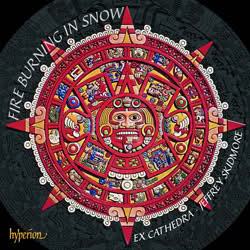BBC Music Magazine: Disc of the month
Classic FM Magazine: Opera & vocal disc of the month
‘Skidmore and his choir … have included the largest of Araujo’s liturgical pieces, an imposing Dixit Dominus in eight parts. The colourful, carefully paced sequence is interspersed with sections of an anonymous setting of the Quechua text Hanacpachap Cussicuinin, a Marian hymn that is regarded as the oldest printed piece of polyphony from the Americas. With beautifully varied instrumental support, Ex Cathedra turn it into a hauntingly beautiful processional’ (The Guardian)
‘Followers of Jeffrey Skidmore’s earlier excursions into the Latin American Baroque with his Ex-Cathedra group should need no prompting to buy volume three … Nothing stifles the infectious spark of these mostly secular effusions by the 17th-century Juan de Araujo, cathedral organist in Bolivia. Uplifting, and foot-tapping’ (The Times)
‘The performances throughout can hardly be faulted. A lovely and varied sonority is created by soloists emerging and returning from the 14-strong choir. The instrumental contribution is equally distinguished, from sensitive continuo of sustained organ and more rhythmically engaging plucked strings, to a positive kaleidoscope of wind and brass in the larger numbers’ (BBC Music Magazine)
‘… Captures the essence of music informed by the assured grandeur of 16th-century Spanish music, tinged with the colour of native ‘Indian’ culture and often marked by vibrant echoes of the regions’ African slave communities … An unmissable release’ (Classic FM Magazine)
‘A hugely appealing, atmospheric disc … The reason we should bother with such an obscure composer is clear from the first note – the vivid contrasts and thrilling rhetoric found in Gabrieli and Monteverdi are developed and combined with a magical, dramatic, dark-hued Iberian sensibility’ (Sunday Times)
‘Araujo is rightly considered to be perhaps the finest composer of his age working in Latin America … This is a captivating, colourful recording which may breathe the stiller London air but audibly relishes the genius of the too-long-neglected Juan de Araujo’ (International Record Review)
‘Araujo’s fusion of European-style vocal techniques with foot-tapping Latino rhythms is a revelation. Bouquets to Hyperion for opening our ears to these riches, and to the Birmingham-based Ex Cathedra vocal and instrumental ensemble, under scholar-director Jeffrey Skidmore, for such engaging performances’ (Financial Times)
‘It’s superbly performed … The most impressive element is the precision, blend and sonority of his singers in a splendid setting of Dixit Dominus. The evocation of a bullfight in Salga el torillo hosquillo (in which the Matador is compared to the Virgin Mary) is thrilling in its energy and drama, and the contemplative serenity of Silencio is breathakingly beautiful … This is a terrific disc’ (Gramophone)
‘Jeffrey Skidmore not only has this repertoire thoroughly under his skin, but equally the ability to inspire his splendid forces to communicate his enthusiasm for it with colourful immediacy’ (Goldberg)
‘The performances are glorious. Soloists and choir sing lustily but stylishly, and the instrumental backing is aptly contrived. Even more than in past volumes, I found this release just plain enchanting. Fine notes, full texts and translations. In all, one of those releases that is truly perfect! What an absolute treasure Hyperion has in Skidmore and his confederates!’ (American Record Guide)
‘The rediscovery of Latin American baroque music was a success story waiting to happen: it combines the dramatic contrasts of texture and the expressive word-setting of the European baroque with the rhythmic energy of New World folk music and the dances of West African slaves … The choral textures are thrilling’ (Oxford Today)
‘This is a splendid disc and a very worthy successor to the preceding volumes. The standard of performance is unfailingly excellent. Ensemble work, both vocal and instrumental, is tight and the many vocal solos are all taken extremely well. The performances display flair and finesse on the part of all concerned Jeffrey Skidmore’s direction is perceptive, lively and, above all, persuasive. It’s quite astonishing to think of this music being composed and performed in a remote colonial outpost in seventeenth century Latin America and the survival of the music and its revival today is something for which we should be grateful. Juan de Araujo was a fine composer and he has been exceptionally well served here by Jeffrey Skidmore and Ex Cathedra. This is a CD that commands attention’ (MusicWeb.com)
‘High art meets the reality of the New World, resulting in a new music that modern performers and audiences are just beginning to appreciate … This is exactly what the classical music ‘industry’ should be about’ (PositiveFeedback.com, USA)
‘Jeffrey Skidmore continues his exploration of Latin American Baroque music with an imaginatively programmed disc largely devoted to the music of the Spanish-born Juan de Araujo (1648–1712), who spent the final 30 years of his life as organist at the cathedral of La Planta (now Sucre, Bolivia). Judging by what’s here recorded, Araujo was equally at home in sacred and secular pieces: the Dixit Dominus for three choirs is particularly attractive, and his secular music has an irresistible foot-tapping quality. We remain indebted to Skidmore and the fine vocal and instrumental forces of his Ex Cathedra ensembles for resurrecting this material. An important release’ (Choir & Organ Magazine)
‘Araujo’s music is very different: sophisticated and marvellously expressive, and Ex Cathedra makes the most of it. The poetry too is worthy of attention: very enjoyable’ (Early Music Review)
‘Jeffrey Skidmore and Ex Cathedra of Birmingham have made a hit recently, with their recording of South American music … Another hit which you can’t keep out of your mind, released by Hyperion’ (Daily Mail)
‘The instrumental ensemble is exciting, vital, rhythmically alert … The music of Juan de Araujo … is unquestionably a good find’ (Fanfare, USA)
‘IM-PER-DÍ-VEL’ (Guess who)
Ex Cathedra: Baroque Music from Latin America – vol 3: Fire Burning In Snow
Anonymous
01. Hanacpachap cussicuinin – 1. verses 1-5
Juan de Araujo (Villafranca en León/En Cáceres ca. 1646 – Chuquisaca, 1712)
02. Dixit Dominus a 3 choros
03. Silencio
04. Dime, amor
05. ¡A, de la region de luces!
Anonymous
06. Hanacpachap cussicuinin – 2. verses 6-10
Juan de Araujo (Villafranca en León/En Cáceres ca. 1646 – Chuquisaca, 1712)
07. ¡A, del cielo!
08. ¡Fuego de amor!
09. En el muy gran Padre Ignacio
Anonymous
10. Hanacpachap cussicuinin – 3. verses 11-15
Diego José de Salazar (c1660-1709)
11. ¡Salga el torillo hosquillo!
Juan de Araujo (Villafranca en León/En Cáceres ca. 1646 – Chuquisaca, 1712)
12. Dios de amor
13. ¡A, del tiempo!
Anonymous
14. Hanacpachap cussicuinin – 4. verses 16-20
Baroque Music from Latin America – vol 3: Fire Burning In Snow – 2007
Ex Cathedra Choir & Ensemble and QuintEssential Sackbut & Cornett Ensemble
Director: Jeffrey Skidmore
BAIXE AQUI – DOWNLOAD HERE
MP3 320 kbps – 205,3 MB – 1,2 h
powered by iTunes 9.2
Boa audição.
.
.
Avicenna


Boa noite Vanderson.
Com o perdão da palavra, faltou um pouco de pesquisa para você encontrar a resposta para tua questão. Li o seu comentário e fiz uma pesquisa no Google: Youtube, para ver o citado desenho:
http://www.youtube.com/watch?v=kQvyWYuBpcE
Mais pesquisa e encontrei este link onde há parte da resposta:
http://baconfrito.com/musica-classica-no-papo-animado.html
Então lembrei-me do divertidíssimo duelo de pianos e patos loucos no Roger Rabbit:
http://www.youtube.com/watch?v=6H9f8qUrF6w
E então não tive dúvida: trata-se da Rapsódia Húngara 2, de Franz Liszt. Quer mais? Baixe-a aqui:
http://pqpbach.opensadorselvagem.org/franz-liszt-1811-1886-10-hungarian-rhapsodies/
Diante da (mais uma vez) grandiosidade da postagem fico até encabulado de fazer a pergunta: a ausência do encarte desta vez foi intencional, ou foi um acidente, caro Avicenna?
Estou mais uma vez não só deslumbrado como embasbacado com tanta beleza… e desta vez, no Dixit Dominus de Araujo, com uma impressão em especial: como se por trás das construções que em si não teriam nada para diferir significativamente de um Monteverdi ou de um Schütz eu desta vez realmente vislumbrasse a paisagem dos altiplanos da América, seus ventos, seu relevo, vegetação, luminosidade característica… substituindo o cheiro de maresia veneziana e/ou bizantina que sinto em Monteverdi.
Deixando ainda mais específico: lembro de conjuntos de música andina de primeira qualidade – por exemplo os bolivianos Los de Canata, outros peruanos que não lembro o nome agora, ou os trabalhos realizados na europa pelo chileno (creio) Darío Domínguez… e pela primeira vez percebo que não é descabido ver relações entre aquela música e um barroco como ESTE!
Ora, jamais saberemos como era a música que efetivamente soava nos Andes antes da chegada dos europeus. E assim como muito da música mais legitimamente popular do sertão nordestino traz as marcas da Idade Média e Renascença mediterrânea; como o sertanejo do Centro-Sul (sim, desculpem, mas é precisamente essa, a mais pobre das músicas do povo brasileiro) deriva inequivocamente do estilo galante e da suas decorrências como praticadas por Haydn, Mozart e levas de italianos – e isso como decorrência de EM QUE ÉPOCA o Rio de Janeiro passou a atuar como capital…
… desse modo, pela primeira vez suspeito que a música andina que conhecemos hoje não seja de nenhum modo um produto “puramente americano”, e sim resultado de uma fantástica fagocitose recíproca (ou também antopofagia, no sentido oswaldiano) em que todas as partes comeram todas (epa!) e depois ainda se cruzaram multiplamente entre si (epa epa!), porém tudo isso presidido pelo caráter de Pacha Mama, da Mãe Terra em sua encarnação com cor, sabor, cheiro das altitudes dos Andes, Sierra Madre e outras que tais.
(Ô meu Deus, acho que nem vou me atrever a reler, mas vou despachar rapidinho esta sessão de delírio enquanto tenho coragem! rsrs)
Prezado Ranulfus,
Perdoe meu esquecimento, a idade se faz presente.
O encarte agora está na postagem e em: http://rapidshare.com/files/416149364/AVI-100830-Baroque_Music_from_Latin_America_Vol.3-encarte.rar.html
Vanderson:
Eis o desenho em questão:
http://www.youtube.com/watch?v=ASN9MlEN5r0
Eis a fonte da resposta:
http://br.answers.yahoo.com/question/index?qid=20100223102034AA9Zkar
Eis a resposta:
http://www.youtube.com/watch?v=zKM0NOxVTzY
E o link para você baixá-la daqui do PQP Bach:
http://pqpbach.opensadorselvagem.org/nikolai-rimsky-korsakov-1844-1908-suite-de-o-galo-de-ouro-le-coqor-suite-gioachino-rossini-1792-1868-william-tell-overture-piotr-i-tchaikovsky-1840-1893-marcha-eslava-emmanuel-ch/